"Inequalities of Human Condition," by John Lyon

John Lyon prepared this oration, entitled “Inequalities of the Human Condition," for the commencement ceremonies held July 11, 1839.


John Lyon prepared this oration, entitled “Inequalities of the Human Condition," for the commencement ceremonies held July 11, 1839.
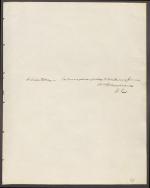
William Woodward prepared this oration, entitled “Encouragement Due to Worth and Genius," for the commencement ceremonies held July 19, 1838.
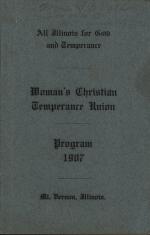
This Woman’s Christian Temperance Union program from Mt. Vernon, Illinois contains psalms, a schedule of meetings, and a roster of the organization's officers and members.

The Independent Theosophical League creates this pamphlet to outline policies and positions as well as discuss the reasons to form of an Independent Section of the Theosophical League.

James M. McKim, a member of the Class of 1828 and an editor at the Philadelphia based The Anti-Slavery Standard, writes to a subscriber, Mr. Worrell.
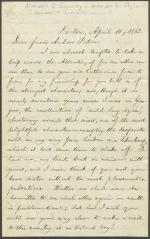
Moncure D. Conway carries a letter for abolitionist William L. Garrison, who writes from Boston to his friend, Andrew Paton in Glasgow, Scotland, and introduces Conway in terms of highest commendation.
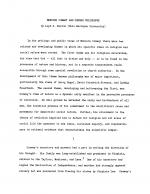
Typescript of "Moncure Conway and German Philosophy," a speech given by Loyd D. Easton of Ohio Wesleyan University for the Boyd Lee Spahr Lecture at Dickinson College on April 24, 1969.

Benjamin Rush writes to an unidentified doctor and thanks him for his long letter as well as the enclosed newspaper clippings.

The collection contains correspondence, pamphlets, and photographs of Dr. Annie (Wood) Besant (1847-1933), a prominent and revolutionary freethinker of the late nineteenth and early twentieth centuries. Besant was a Christian wife and mother who later in life became an Atheist doctor and activist. She became active in social reform after her children had been taken from her following her separation from her husband. In her later years Besant moved to India to help champion the cause of home rule in that country. The correspondence consists mainly of letters from Besant to her friends, family, and colleagues in the United States, England, and India. A particularly noteworthy letter is one written to Besant from Mohandas Gandhi. Also included in the collection are pamphlets written by Besant, a stamp from India dedicated to her honor, and several photographs of Besant.
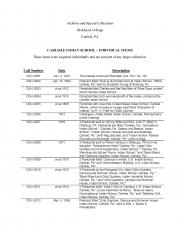
These items about the Carlisle Indian School were acquired by the Dickinson College Archives and Special Collections individually and are not part of any larger collection.

This collection consists of drafts, letters, manuscripts, notes, financial accounts, and a prospectus for the publication of a book. Specifically, there are lectures and notes on mechanics, as well as drafts for patents on inventions submitted to the Royal Commissioners of the Great Exhibition of 1850, including an air engine. The collection also includes letters and papers on W. L. Henson's Knitting Machine, plans and contracts for the establishment of railways and public works in India, and photographs of the "New" Lebaudy Airship and Airship Hanger.

Moncure Daniel Conway was born into a southern aristocratic family, but ultimately became one of the nation's leading abolitionists and humanitarians. Conway was a graduate of Dickinson College in 1849 and was trained for the ministry at Harvard Divinity School. The collection consists mainly of correspondence relating to all phases of Conway's career; his student days at Dickinson and at Harvard, his anti-slavery witness, and his pastorate at South Place Chapel in London. His letters reflect his wide acquaintance with leading intellectual and political figures of his day; some of his correspondents include Ralph Waldo Emerson and Dr. Annie Besant.
The journal in this collection has been digitized and is available for reading online (see the link for related entries below).

This collection consists of the essays and sermons of Walter L. Crowding, Dickinson Class of 1925 and Methodist minister. Most of the essays are written upon various topics in religion, but also included are treatises on art and literature. The majority of the collection is comprised of more than 800 sermons presented by Crowding from 1921 to 1975.

The records contained in the President Herman Merrills Johnson record group pertain only to his time and affairs as president of Dickinson College. As such, no personal papers or papers pertaining to Johnson’s tenure as a faculty member are included in this record group. For records concerning Johnson’s interactions with students, please refer to RG 5/1. The Johnson records are arranged into two series: General Business, and Personnel.
Please see the Herman Merrills Johnson Personal Papers (MC 2003.9) and the Herman Merrills Johnson Scrapbook (MC 2000.9) in the Manuscript Collections for further personal information.
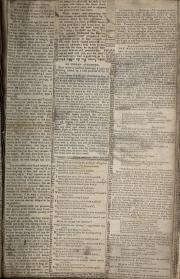
This Herman Merrills Johnson collection consists of a scrapbook believed to have been kept by the former college president Herman Merrills Johnson throughout his lifetime and continued by his son Theodore. The collection is housed in one document box. Newspaper clippings from the New York Sentinel, The Emancipator, and Methodist periodicals constitute the bulk of the scrapbook. A number of poetic verses are also included, although none of the poems appear to have been authored by Johnson.
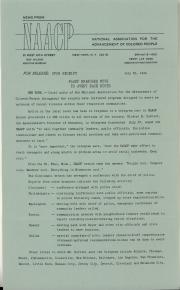
Charles Flint Kellogg was a member of Dickinson's history department from 1946 to 1975. His scholarship focused on the National Association for the Advancement of Colored People (NAACP). Kellogg helped to establish black studies courses at the College and taught courses on black history. This collection documents his academic career, including his graduate studies at The Johns Hopkins University, his teaching career at Dickinson, and his research into the NAACP. In addition to Kellogg's own correspondence and research materials, this collection also includes press releases produced by the NAACP from 1957 to 1964.
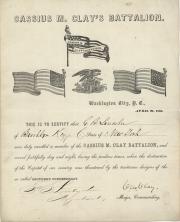
The collection consists of correspondence, genealogical materials, legal materials, printed and scrapbook materials relating to George Burt Lincoln. Correspondents include Abner Doubleday, Horace Greeley, Julia Ward Howe, and Elizabeth Cady Stanton. Of particular note is a letter from Julia Ward Howe discussing women's study clubs.

The collection consists of correspondence, legal and financial materials primarily related to Price's law practice, his service in the Pennsylvania State Senate (1854-1856), and as a commissioner for Fairmount Park Association. Also included in the collection are papers concerning the Fisher's Creek Improvement Company and from the files of Eli Kirk Price, Jr., correspondence and applications for the Keene Home for Women, a retirement home in Bristol, Pa.

Leon Cushing Prince (1878-1937) graduated from Dickinson College in 1898 and received his law degree from the Dickinson School of Law and his masters from New York University. Prince returned to Dickinson in 1907 to become a professor of history, where he would teach for thirty years until his death. He was elected a Pennsylvania state senator in 1928 and served for two terms. The collection contains material dated 1898-1937, and includes correspondence, legal documents, literary materials, printed materials, and other memorabilia. The bulk of the collection centers around manuscripts of Prince's research notes, sermons, speeches, and writings. Other materials in the collection include newspaper clippings, correspondence with other professors regarding lecture appearances, and printed material on the Kiwanis Club.
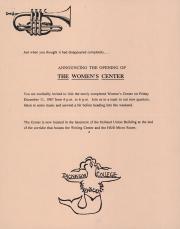
These records document the activity and organization of the Zatae Longsdorff's Women's Center, a feminist organization at Dickinson that included student and faculty members.

The collection includes correspondence, speeches, essays, notebooks, bills, printed materials, and notes on debates and other such topics as the Light Street Institute and the Washington Temperance Society. The collection spans three main time periods in Zug's life: his enrollment at Dickinson College from 1836 until 1839, his formation of and participation in the Light Street Institute from 1839 until 1840, and his involvement in the Washington Temperance Society from 1840 to 1842. Other time periods are included, but not as extensively. The collection contains no large gaps in documentation. One item of interest is a manuscript entitled "An Old Bachellor's[sic] Mountain Musings." The opening line of the piece, which is not dated, states that the author, presumably Zug, is forty-seven years old. However, this is not possible, as Zug died on September 5, 1843, at the age of twenty-five.